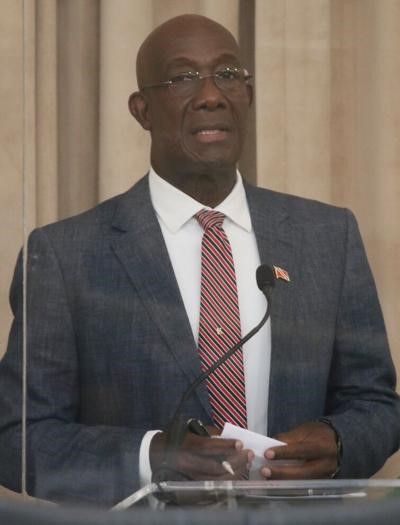(Trinidad Guardian) Prime Minister Dr Keith Rowley has announced the imminent rollout of a Caribbean-wide gangs database and the implementation of the Caricom Arrest Warrant Bill, which aims to ensure no safe harbours for criminals anywhere in the region.
Speaking at Caricom’s second regional symposium titled- Violence as a Public Health Issue in Georgetown, Guyana, yesterday, Rowley emphasised the importance of these initiatives in strengthening regional security and law enforcement collaboration.
“The Caribbean Gang Database will be a key resource for law enforcement,” Rowley said, adding, “Information is strength. By identifying and sharing intelligence on known bad actors, law enforcement across the region can work more effectively.”
He highlighted the significance of the Caricom Arrest Warrant Bill, which aims to standardise extradition processes across member states.
“Criminals must understand that in every Caricom territory, the law applies equally to them as it relates to warrants in anticipation of prosecution. There are no safe harbours in any Caribbean territory. We want this legislated,” Rowley stated.
He underscored the role of tools such as the Advance Passenger Information (API) and Passenger Records Bill in enabling better law enforcement.
“These tools will facilitate law enforcement efforts and enable authorities to apprehend criminals more effectively,” he said.
Rowley reiterated the need for comprehensive solutions, saying the symposium provided a timely opportunity to engage in critical topics, including the transnational nature of gangs, cultural influences on crime, and the role of corruption in law enforcement.
“Each of these demands our attention if we are to transform the realities of the Caribbean,” he added.
Earlier this year, there were reports from the media in St Lucia that gangs from Trinidad were trying to recruit members from that island.
Police officials in St Kitts and Nevis as well as Grenada also barred Trinibad artiste Kman Sixx from performing in both countries citing a possible spillover of gang activity and safety concerns.
The Prime Minister of St Vincent and the Grenadines has also complained about a rise in criminal activity this year, in particular gang violence.
Meanwhile, the President of Guyana, Dr Mohamed Irfaan Ali, echoed Rowley’s sentiments, emphasising the economic and social costs of crime in the region.
“The healthcare sector is the first to feel this burden. Imagine if we didn’t have this impact. We could have increased budgetary allocations in education by 80 per cent.”
Ali pointed to recent findings by the Inter-American Development Bank.
“The direct cost of crime and violence in Latin America and the Caribbean reached 3.44 per cent of the region’s GDP in 2022. For us, this means reallocating scarce resources that could have been used for education and human capital development,” he explained.
He also addressed the gender imbalance in crime statistics and its implications.
“Eighty-five per cent of violent crime is committed by males. In Guyana, 66 per cent of university students are women, and 70 per cent of scholarships are taken up by women. The consequence is clear—young men are falling behind in education and employment, driving them toward crime,” Ali said.
Highlighting the regional nature of the crime, he noted the challenges posed by illegal weapons and gang activity.
“In countries like Trinidad and Tobago and Guyana, we face not only the influx of illegal weapons but also the movement of gangs. This is further complicated by large populations like Venezuela and the international cartels that use our airspace,” he said.
Ali stressed the importance of collaborative approaches.
“We have moved from siloed national strategies to integrated regional task forces. Between 2019 and 2024, we increased our allocation to security by 154 per cent. This reflects the scale of the problem we are addressing,” he explained.

